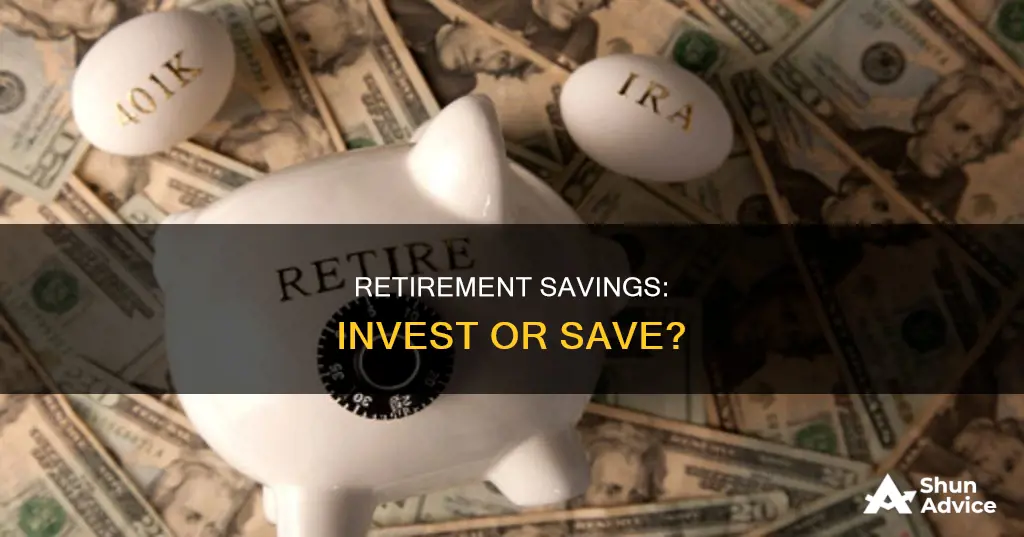
Saving for retirement is one of the most important things you can do with your money, and the earlier you start, the less you'll need to put away each year. While there's no magic age that dictates when it's time to switch from saving to spending, the general rule of thumb is that it's safe to stop saving and start spending once you are debt-free, and your retirement income can cover your expenses and inflation. This approach only works if you don't go overboard with your spending, so creating a budget can help you stay on track.
What You'll Learn

Start saving early to benefit from compound interest
Saving early for retirement is a common piece of financial advice, and for good reason. The earlier you start saving, the more time your money has to grow, and the more you'll be able to benefit from compound interest.
Compound interest is a powerful tool for savers. It allows you to earn interest not just on your principal amount but also on the interest that your principal amount accumulates over time. This means that the longer you save for, the more your money will grow, even if you're only earning a small amount of interest each year.
For example, let's say you invest $1,000 in a long-term bond that earns 3% interest per year. In the first year, your investment will grow by $30, to $1,030. In the second year, you'll earn 3% of $1,030, so your investment will grow by $30.90. This might not seem like much, but the growth will accelerate over time. By the 39th year, your investment will be worth around $3,167, and by the 40th year, it will be worth $3,262.04. That's a one-year difference of $95, demonstrating the power of compound interest.
Now consider the impact of time on these returns. If you start saving at 30 and contribute $500 a month until you're 67, assuming a hypothetical 6% return per year, you'll have $763,609 waiting for you when you retire. However, if you start at 40 and contribute $800 a month until 67, also with a 6% return, you'll have $611,575. Even though the person who started later contributed more each month, they ended up with almost $152,000 less, simply because they had less time for their savings to benefit from compound interest.
In addition to the power of compound interest, starting early also gives you more flexibility in your savings plan. You can afford to put away less money per month, and you'll have more time to recover from any market losses. It's also easier to save when you're younger, as you may have fewer financial responsibilities and expenses.
So, if you're thinking about saving for retirement, the best time to start is now. The earlier you begin, the more time your savings will have to grow, and the more you'll be able to take advantage of compound interest.
Uncover Your Investment Strategy: A Guide to Defining Your Buying Approach
You may want to see also

Save 10-15% of your income
Saving 10-15% of your income is a common rule of thumb for retirement planning. However, it's important to note that this may not be enough, especially if you plan to retire early or have a higher cost of living during retirement. Here are some things to consider when saving for retirement:
Start Saving Early
The power of compound interest means that starting to save early can make a big difference in the long run. Even if you can't save a large amount, giving your savings extra years to grow is beneficial. If retirement is decades away, it might be challenging to think about, but it's precisely the time to start planning and saving.
Take Advantage of Tax-Advantaged Accounts
Utilize tax-advantaged savings accounts like 401(k)s and Individual Retirement Accounts (IRAs). These accounts offer tax benefits that can help your savings grow faster. For example, with a traditional 401(k) or IRA, your contributions are made before tax, reducing your current taxable income. The money then grows tax-free until you withdraw it in retirement.
Employer Matching
If your employer offers a 401(k) match, be sure to take advantage of it. This is essentially "free" money that can boost your retirement savings. Contribute at least enough to get the full company match.
Save More if You Plan to Retire Early
If you're aiming for early retirement, you'll likely need to save more than 15% of your income. This is because you have fewer years to benefit from compound interest, and you may have a longer retirement to fund.
Consider Other Investments
In addition to tax-advantaged accounts, consider other investment options such as brokerage accounts, real estate, or investing in a small business. These options may provide higher returns but also come with higher risks.
Consult a Financial Professional
Retirement planning can be complex, and it's important to make sure you're on the right track. Consult a financial advisor or planner to help you create a personalized plan that takes into account your income, desired retirement age, and lifestyle goals.
Remember, saving for retirement is a marathon, not a sprint. It requires discipline, consistency, and, in some cases, creativity to ensure you have enough funds to maintain your desired lifestyle during retirement.
The Investment Payoff: When Returns Come Full Circle
You may want to see also

Automate your savings
Automating your savings is a great way to ensure that you save a consistent amount of money without having to make a conscious decision to do so each time. Here are some ways to automate your savings:
Save Money from Every Paycheck
A common saying in personal finance is to "pay yourself first". Before your paycheck arrives in your bank account, set up a plan to put some of that money into a retirement savings plan or cash savings account. Most banks allow you to set up automatic deposits from your checking account to your savings or retirement account.
One of the best ways to save automatically is to enrol in your employer's tax-advantaged retirement plan, such as a 401(k) or 403(b) plan. Depending on the rules and limits of your retirement plan, you may be able to save a percentage of your salary, and your employer will match your contributions up to a certain percentage.
Choose the Right High-Interest Savings Account
To maximise your savings, choose a high-interest savings account, which offers rates that are much higher than the national average. Online banks often have the most attractive interest rates. Consider switching banks if your current account doesn't pay much interest. Also, consider the deposit requirements and fees—these can quickly cut into your interest payments.
Use Automatic Savings Tools
In recent years, a variety of new apps and savings tools have been introduced to help people save money. Some of these tools, known as round-up apps, automatically save your spare change by "rounding up" the amounts from everyday purchases. Examples of such apps include Acorns, Stash, and Digit (now known as Oportun).
Set Up Direct Deposit
Direct deposit is one of the easiest ways to save. Simply elect to send a portion of your paycheck to your savings account. When filling out the direct deposit paperwork provided by your employer, include your savings account information in addition to your everyday spending account. Most institutions allow you to choose a dollar amount or a percentage of your total check.
Track Your Savings Progress
There are plenty of budgeting apps that can help you track your progress toward savings goals, and some savings accounts offer these tools already built-in. Another option is to create a simple yet customised spreadsheet. Set up an Excel file or Google sheet with columns for the date, pending contributions, and savings. Every time you transfer money to your savings account, move the number from the "Pending" column to the "Savings" column.
Manage Windfalls Wisely
If you've received a large sum of money, such as a bonus, inheritance, or proceeds from the sale of a home or business, it might be tempting to splurge on a major purchase. Start by putting the money in a high-yield savings account, and then take time to evaluate your options. Talk to a financial advisor if you have concerns about the tax implications or want to make the most tax-efficient decisions.
Automating your savings is a great way to ensure that you're consistently putting money away for the future, whether it's for short-term goals or long-term goals like retirement.
Who Pays for Investment Advice?
You may want to see also

Prioritise retirement savings over other financial goals
Retirement savings are an important aspect of financial planning, and while it may be tempting to focus on shorter-term goals, prioritising retirement savings can have numerous benefits. Here are some reasons why you may want to put your retirement savings first:
Compound interest
The earlier you start saving for retirement, the more time your savings have to grow. Compound interest means that the interest you earn on your savings is added to your balance and then itself earns interest. Over time, this can lead to significant growth in your retirement fund.
Take advantage of employer contributions
If your employer offers a retirement plan such as a 401(k) or 403(b), it is generally a good idea to contribute to it, especially if they offer matching contributions. This is essentially free money that can boost your retirement savings. By prioritising retirement savings, you can ensure you are taking full advantage of these contributions.
Tax benefits
Retirement savings accounts often come with tax benefits. For example, with a traditional IRA, you can deduct your contributions from your income when you file your taxes, reducing your taxable income. Similarly, contributions to a 401(k) can lower your taxable income, giving you a slight break on your taxes.
Peace of mind
Saving for retirement can provide peace of mind and financial security for your later years. It can ensure that you have enough money to cover your living expenses and maintain your quality of life during retirement. This can be especially important if you are unable to work or your medical expenses increase during retirement.
Long-term focus
While shorter-term financial goals are important, they may not always be as impactful as saving for retirement. Retirement savings require a long-term focus, and by prioritising them, you can ensure that you are prepared for the future. This may involve making trade-offs with your shorter-term goals but can be worth it in the long run.
Mortgage or Invest: Where Should Your Money Go?
You may want to see also

Consult a financial advisor
Consulting a financial advisor is a crucial step in planning for retirement, and it's important to find one who suits your needs. Here are some reasons why:
Expertise and Guidance
Financial advisors are experts in their field and can offer valuable guidance in planning for retirement. They can help you formulate a comprehensive plan that takes into account your current financial situation, retirement goals, risk tolerance, and expected expenses during retirement. This plan will ensure you're on track and provide a sense of security.
Investment Strategies
Advisors can also suggest investment strategies to make your money work harder for you. They will consider your risk tolerance, time horizon, and financial goals to recommend suitable investments. This may include stocks, bonds, mutual funds, or other investment vehicles that match your retirement timeline.
Tax and Estate Planning
Retirement planning often involves complex tax considerations. Financial advisors can help you navigate these intricacies, suggesting strategies to minimise taxes on your retirement income and distributions. Additionally, they can assist with estate planning, ensuring your wishes are carried out and potential tax burdens on your heirs are reduced.
Regular Reviews and Adjustments
Life is full of changes, and a good financial advisor will help you adjust your retirement plan as your life evolves. Whether you experience a windfall, a career change, or the birth of a child, they will guide you in updating your plan to reflect your new circumstances. Regular reviews ensure your plan stays current and adaptable.
Emotional Support and Accountability
Retirement planning can be emotionally challenging, and a financial advisor acts as a supportive coach, keeping you accountable to your goals. They provide perspective during volatile economic times and help you avoid impulsive decisions. Their guidance can give you peace of mind and help you stay committed to your long-term retirement strategy.
When choosing a financial advisor, it's essential to select one who is a fiduciary and always acts in your best interest. Understand their fee structure, credentials, and whether they specialise in retirement planning. By consulting a qualified financial advisor, you can feel more confident in your retirement journey, knowing you have a trusted expert by your side.
Extra Loan Payments or Investments: Where Should Your Money Go?
You may want to see also
Frequently asked questions
Saving for retirement is crucial as it ensures you have enough money to sustain yourself during your retirement years. The earlier you start saving, the less you'll need to put away each year, and the less money it will take overall.
This depends on various factors, including your lifestyle, retirement age, and other sources of income. A common rule of thumb is to save 10-15% of your income. However, some experts suggest saving one to one-and-a-half times your current salary by age 35, three-and-a-half to six times your salary by age 50, and six to 11 times your salary by age 60.
There are several account options for retirement savings, including 401(k) plans, Individual Retirement Accounts (IRAs), and Health Savings Accounts (HSAs). 401(k) plans often include employer matching contributions, making them a great option. IRAs offer tax advantages, such as tax-deductible contributions or tax-free withdrawals in retirement. HSAs can also boost your retirement savings while providing tax benefits for qualified medical expenses.
The best time to start saving for retirement is now. The earlier you begin, the more time your savings have to grow, and the less you'll need to save each year. Don't wait until it's too late to start planning for your retirement.







